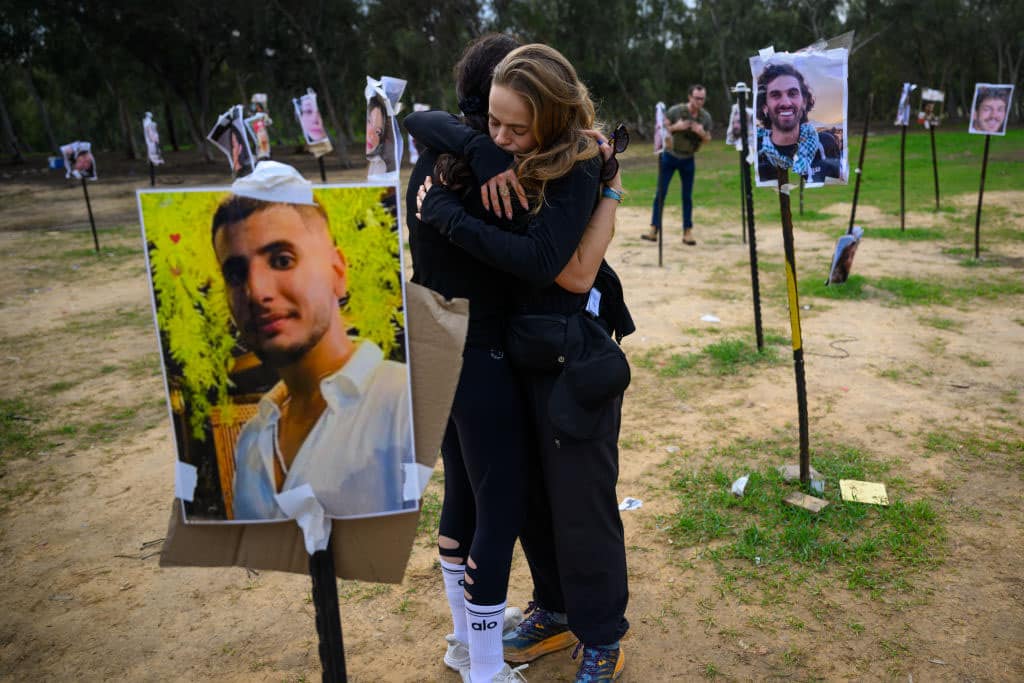 Friends hug at a memorial in Re’im, Israel displaying photos of people killed or kidnapped during the Hamas attack on the Super Nova festival on October 7th.(Photo by Alexi J. Rosenfeld/Getty Images)
Friends hug at a memorial in Re’im, Israel displaying photos of people killed or kidnapped during the Hamas attack on the Super Nova festival on October 7th.(Photo by Alexi J. Rosenfeld/Getty Images) It’s humbling when you make a living by choosing the right words and something happens when those words fail you. “There are no words” is the common cliché we use when something overwhelms us. This tragedy is so horrible, this art is so sublime, this emotion is so intense…there are no words. But in truth, even saying “there are no words” is a choice of words.
If there really were no words to describe this thing or that, we would just say nothing.
Over the past four weeks of my visit to Israel, I often found myself tongue-tied by the enormity of October 7. The scope of the massacres, the intimacy of the barbarity, were so overwhelming it felt lame to use ordinary language. Words give you a sense of control over something. If I can describe it, if I can analyze it, if I can label it, the event will not own me. I will own it.
Yet something about October 7 makes me reluctant to want to own it. I feel more honorable if I allow it to wash over me, so I can grieve the losses, so I can come just a little closer to feeling the bewildering pain and horror of the victims.
The more I talk, the more I describe, the further I get from that pain.
Even a proper word like “resilient” can create distance. It’s too on the nose. It’s not surprising that an extraordinary spirit of survival and resiliency has overtaken Israeli society. You feel it everywhere you go. Like the cab driver who has two sons fighting in Gaza told me, “We have no choice.”
Post October 7, Israel is in survival mode. It has no choice. The less I talked about it, the more I felt it.
This survival mode can create awkward situations. A friend tried to describe the emotional whiplash of attending a wedding one day and a burial the next. He really couldn’t. Like the cab driver, he had no choice. He attended weddings and funerals because he had no choice. He just did it.
One of the choices that has confronted nearly every Jew since October 7 is what to do about the horrific images. I’ve noticed that in Israel, few people dwell on them. Maybe the images are simply too shattering, too graphic, too cruel. It’s as if people have just enough emotional capacity to withstand the news of daily casualties from the war and the agony of the hostages. Anything more than that may paralyze them.
There is so much to do, so much assistance to provide to the families of victims and the more than 100,000 refugees spread throughout the country, even real, authentic emotions can become a luxury.
There’s an expression in basketball called muscle memory. You take thousands of practice shots during the off-season, so that when you get to a real game, your muscle memory takes over. You can make baskets even when the pressure is intense.
You can feel the intense pressure permeating this ancient land. The defense minister told the country it is fighting a war on seven fronts (Gaza, West Bank, Lebanon, Syria, Iraq, Yemen and Iran). The economy is in crisis. Refugees are everywhere. Casualties are mounting. Hostages remain. International pressure is growing. A national pain hovers like the weather.
Yes, the word “resilient” applies. But even that word, accurate as it is, can feel inadequate. Maybe it’s so true that nobody needs to say it. Maybe what is happening is more than resiliency; maybe it has more layers.
In any case, what I sense is happening for many Israelis right now is that words and ideas and reflection have been overtaken by muscle memory. There is simply too much to do. There are too many people to help. There are too many threats to defend against.
The hero in Israel today is a muscle that has 75 years of active practice—the muscle of survival.
It’s a muscle that has very little time for words.
Shabbat shalom.























 More news and opinions than at a Shabbat dinner, right in your inbox.
More news and opinions than at a Shabbat dinner, right in your inbox.